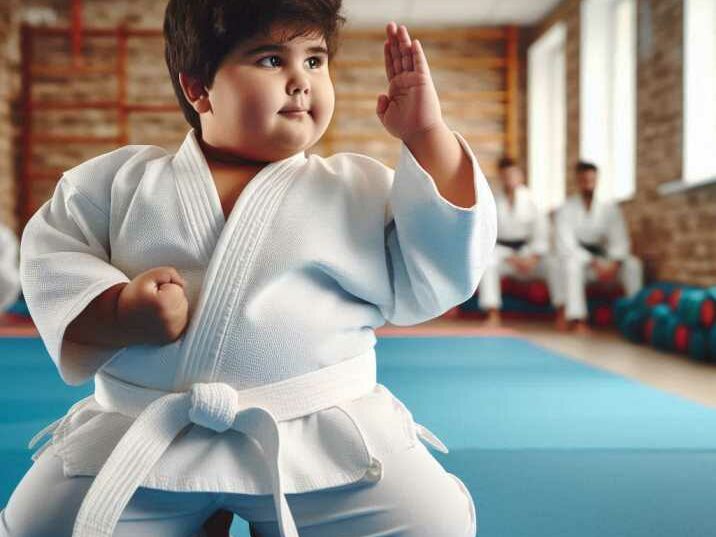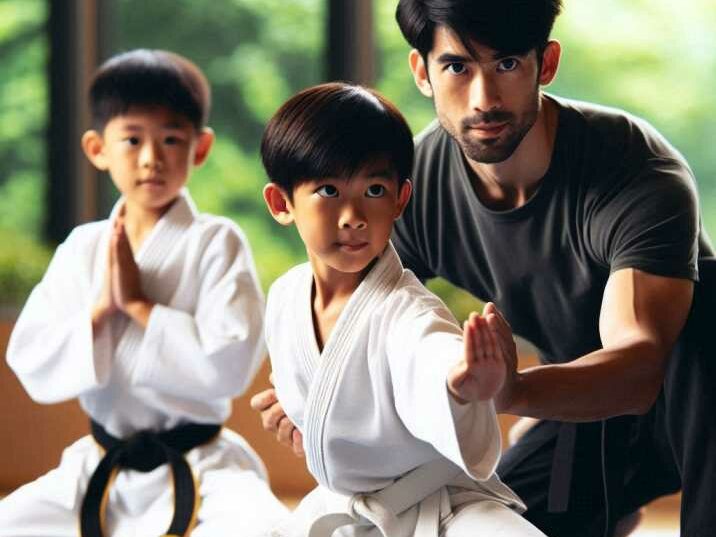Introduction
Table of Contents
Martial arts is an excellent option for overweight or obese children for numerous reasons. Not only does it help with physical health, but it also contributes to mental and emotional well-being. This article will explore why martial arts is beneficial for overweight or obese children by delving into several key aspects. We’ll cover the physical benefits, psychological advantages, social skills development, and how to get started with martial arts.

Table of Contents
- Introduction
- Physical Benefits of Martial Arts
- Psychological and Emotional Benefits
- Social Skills Development
- How to Get Started with Martial Arts
- Choosing the Right Martial Art for Your Child
- Success Stories
- Conclusion
- FAQs
Physical Benefits of Martial Arts
Improved Fitness and Weight Loss
Martial arts offer a full-body workout that is excellent for improving fitness and losing weight. Activities such as kicking, punching, and grappling engage various muscle groups, helping children burn calories and build muscle. Unlike traditional workouts, martial arts are dynamic and varied, which keeps children engaged and less likely to get bored.
Enhanced Flexibility and Coordination
Practicing martial arts helps improve flexibility and coordination. Techniques like high kicks, evasive maneuvers, and stances require children to stretch and move in ways that improve their range of motion. This not only helps in martial arts but also benefits overall physical health, making everyday activities easier and more enjoyable.
Cardiovascular Health
Regular practice of martial arts improves cardiovascular health. The intense physical activity involved in martial arts training increases heart rate, enhancing cardiovascular endurance. This is particularly important for overweight or obese children as it reduces the risk of heart disease and other related health issues.
Psychological and Emotional Benefits
Boosts Self-Esteem and Confidence
Martial arts training builds self-esteem and confidence. As children learn new techniques and progress through different belt levels, they gain a sense of accomplishment. This boost in self-esteem is crucial for overweight or obese children who may struggle with body image issues.
Reduces Stress and Anxiety
Martial arts can be an effective way to reduce stress and anxiety. The physical exertion involved helps release endorphins, which are natural mood lifters. Additionally, the focus required during training sessions helps children forget about their worries and concentrate on the task at hand.
Develops Discipline and Self-Control
Martial arts emphasize discipline and self-control. Children learn to follow instructions, respect their instructors and peers, and control their emotions. These skills are invaluable both inside and outside the dojo, helping children become more disciplined in their daily lives.
Social Skills Development
Encourages Teamwork and Cooperation
Although martial arts are often seen as individual sports, they also require a great deal of teamwork and cooperation. Children often train in pairs or groups, learning to work together and support each other. This helps develop social skills and build friendships.
Teaches Respect and Courtesy
Respect and courtesy are core principles of martial arts. Children learn to bow to their instructors and peers, listen attentively, and show respect in all interactions. These values are essential for developing positive social interactions and are highly regarded in everyday life.
Builds Community and Support Networks
Martial arts schools often foster a strong sense of community. Children and their families become part of a supportive network that encourages each member to achieve their best. This community can be particularly beneficial for overweight or obese children, providing them with a sense of belonging and support.

How to Get Started with Martial Arts
Finding a Suitable Martial Arts School
The first step is finding a suitable martial arts school. Look for schools with qualified instructors, a welcoming environment, and a focus on children’s programs. It’s important to visit a few schools, observe classes, and ask questions to ensure it’s the right fit for your child.
Preparing Your Child for Their First Class
Preparing your child for their first class is crucial. Explain what to expect, ensure they have the appropriate attire (usually a gi or uniform), and encourage them to have an open mind. Remind them that it’s normal to feel nervous and that everyone starts as a beginner.
Setting Realistic Goals
Setting realistic goals is important to keep your child motivated. These could include earning their first belt, mastering a particular technique, or attending classes regularly. Celebrate their achievements, no matter how small, to boost their confidence and keep them engaged.
Choosing the Right Martial Art for Your Child
Popular Martial Arts for Children
Several martial arts are popular among children, including Karate, Taekwondo, Judo, and Brazilian Jiu-Jitsu. Each has its own unique focus and benefits. For example, Karate emphasizes striking techniques, while Judo focuses on throws and grappling.
Factors to Consider
When choosing a martial art, consider your child’s interests and physical abilities. Some martial arts may be more physically demanding than others, so it’s important to choose one that matches your child’s fitness level. Additionally, consider the school’s location, schedule, and cost.
Trial Classes
Many martial arts schools offer trial classes. These are a great way to see if your child enjoys the martial art and feels comfortable in the school environment. Take advantage of these opportunities to find the best fit for your child.
Success Stories
Personal Testimonies
Hearing success stories can be incredibly motivating. Many overweight or obese children have found success through martial arts, not only losing weight but also gaining confidence and improving their overall well-being. These stories can inspire both parents and children to give martial arts a try.
Expert Opinions
Experts in child health and fitness often recommend martial arts for overweight or obese children. They highlight the combination of physical activity, discipline, and social interaction as key factors in the positive impact of martial arts.
Conclusion
In conclusion, martial arts are an excellent option for overweight or obese children. The physical, psychological, and social benefits are immense, making it a holistic approach to improving overall health and well-being. By finding the right martial art and supportive environment, children can embark on a rewarding journey that will benefit them for years to come.
FAQs
1. Is martial arts safe for overweight or obese children?
Yes, martial arts are generally safe for overweight or obese children when practiced under the supervision of qualified instructors. It’s important to choose a school that focuses on safety and proper technique.
2. How often should my child practice martial arts?
Most martial arts schools recommend practicing 2-3 times per week. However, the frequency can vary based on your child’s interest and schedule.
3. What should my child wear to martial arts classes?
Most martial arts schools provide or recommend specific uniforms, such as a gi for Karate or Judo. Comfortable, loose-fitting clothing is suitable for the first few classes.
4. Can martial arts help with my child’s self-esteem?
Absolutely. Martial arts can significantly boost self-esteem as children achieve new skills, progress through belt ranks, and receive positive reinforcement from instructors and peers.
5. What if my child wants to quit martial arts?
It’s important to encourage your child to stick with it, especially during the initial stages. However, if they continue to show disinterest or discomfort, it may be worth exploring other activities they might enjoy.


